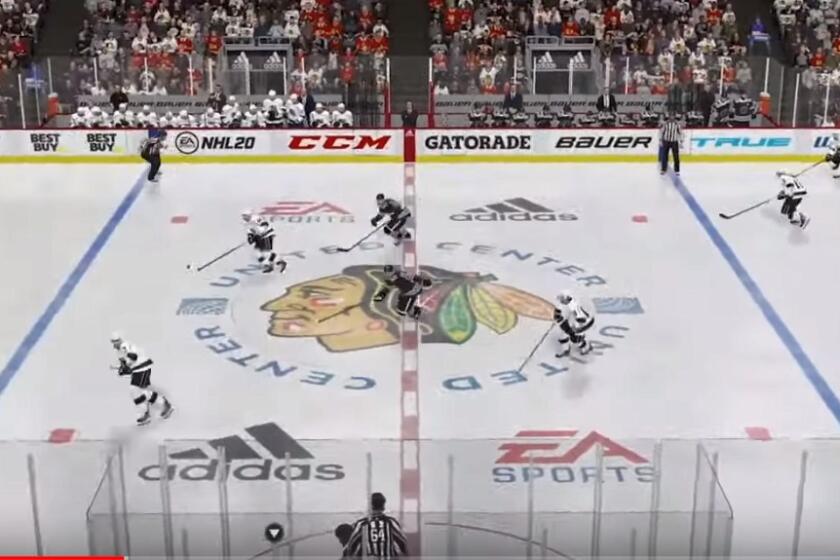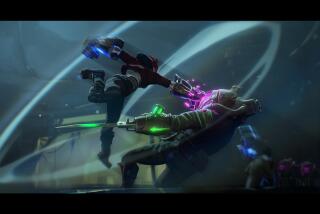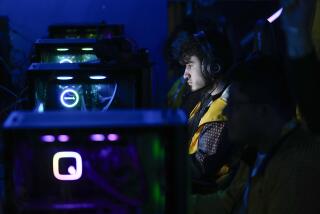Eight million log on daily. Its top players make millions. Will this finally be esports’ moment?
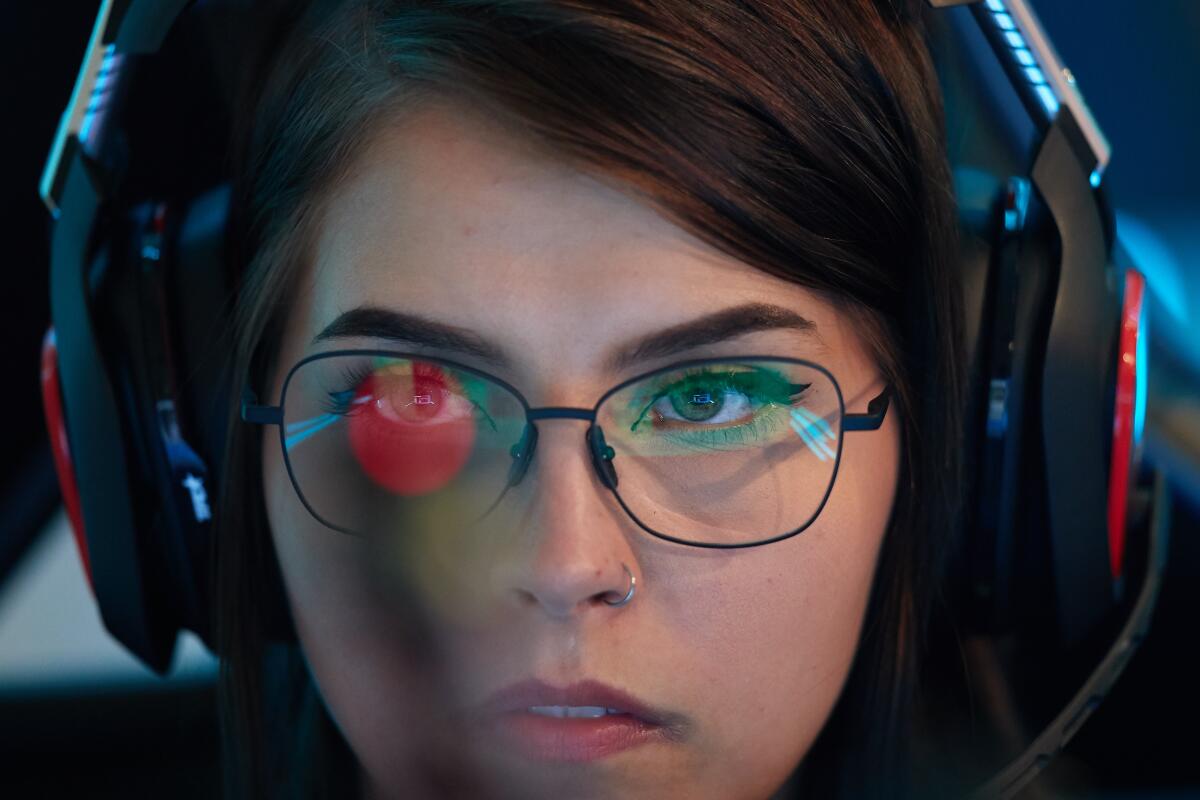
- Share via
Four men appeared on my television at 2 p.m. in neat rectangles. The backgrounds varied. Barren white walls in one, a few frames in another. A window, some furniture. They all had headsets. One wore a burgundy suit and tie. The others went more casual in the confines of their homes.
The gathering resembled the Zoom video chats we have staged with coworkers and friends since the coronavirus outbreak shut down pretty much everything. But this setting was different than our virtual happy hours and mundane meetings.
It was the broadcast for the League of Legends Championship Series (LCS). League of Legends, a multiple-player online battle arena game developed by Riot Games and released in 2009, is the most popular esports title in the world with up to eight million gamers logging on daily to play on their computers. The LCS, which was created in 2012, is the game’s highest level of competition in North America.
It is also one of the few remaining live entertainment options afloat during the COVID-19 pandemic.
Thousands were concurrently watching the stream, presented by a large mainstream advertiser, State Farm, on Twitch and YouTube. It was back online after a one-week hiatus, pushing forward when much of society had skidded to a halt. The matches, regularly held in West Los Angeles in front of a few hundred fans, were staged remotely.
“We feel like we’re weathering the storm pretty well,” LCS commissioner Chris Greeley said, “but obviously, as it is for everyone, it’s still a storm.”
The Kings have found a way to stay connected with fans amid the coronavirus shutdown by replicating its schedule through video games.
I’m a casual gamer. Stick and ball sports were my preference growing up, though in recent years my time has been limited to playing shooters online with friends. It’s a social activity, and one of the few available since COVID-19 arrived. After downloading the game on my laptop, I tried following along with the ad hoc broadcast, curious and confused. I didn’t know the rules or the point of the game but, holed up in my apartment, I welcomed the live competition. The pickings have never been slimmer on a Saturday afternoon.
This should be one of the most exciting periods on the sports calendar. The NCAA Tournament going mad, the start of baseball season, battles for playoff seeding in the NBA, the Masters right around the next magnolia bush, even the XFL for a football fix if mock NFL drafts didn’t suffice.
But those events were postponed for the foreseeable future, if not canceled completely, leaving playing video games — and watching others play them — as two of the limited choices left to sate our social and entertainment thirst. As stadiums and arenas go silent, there is a growing din in a corner of the landscape that until now has largely been drowned out by more traditional, mainstream sports.
It’s coming from the more than 150 million Americans who identify as gamers, and not just the influencers who have become wealthy stars: Ninja, PewDiePie, PrestonPlayz, Markiplier. It’s NBA stars challenging each to other to Call of Duty; teens playing Fortnite at 3 a.m. on indefinite leave from school; 9-to-5 workers at home sneaking in FIFA games between Zoom meetings. It’s me.
Esports were built for the quarantine culture because, to some degree, isolation always has been a part of its DNA. And with hundreds of millions now shut in for the time being, an already robust community senses an opportunity.
This could be esports’ moment.
::
“It is an absolutely terrible thing that’s happening around the world,” Ryan Friedman said. “Obviously, it’s a huge net negative, but with the cancellation of traditional sports, a lot of people who would have never given esports a chance are going to start at least looking into it and that’s a good opportunity for esports to draw in a bunch of new viewers.”
Friedman is the chief of staff of Dignitas, an organization with teams in various esports acquired by the Philadelphia 76ers in 2016. He is also the younger brother of Andrew Friedman, the Dodgers’ president of baseball operations. While Andrew’s team sat idle on opening day last week, wondering if Major League Baseball would have a 2020 season, Ryan’s franchise, one of the 10 in the LCS, stayed busy.
Esports — broadly defined as professional competition using video games — had several major events on the calendar canceled, but most entities have been able to continue competition knowing an amplified audience is available. Evidence of the opportunity is found on Twitch, the go-to streaming platform for casual and professional gaming.
With the cancellation of traditional sports, a lot of people who would have never given esports a chance are going to start at least looking.
— Ryan Friedman, brother of Dodgers president Andrew Friedman
People are streaming and watching streams more than ever since the outbreak began taking hold, according to and TwitchTracker.com and SullyGnome.com, which monitor Twitch audiences. The platform has set all-time highs this month in peak daily active users (22.7 million), average concurrent viewers (1.6 million), and number of streamers (65,000).
“In esports, the show can go on,” esports lawyer Bryce Blum said. “We can transition back to our roots.”
The increase has not, however, been as uniform for conventional esports events. A few esports have seen instant growth in viewers, such as Rocket League and the ESL Pro League, a 24-team Counter-Strike: Global Offensive competition that recently enjoyed its most-watched broadcast day in history. Conversely, League of Legends has experienced a year-over-year jump of around 20,000 viewers on Twitch this month, but has seen a dip since the LCS opened its spring season to great fervor in late January.
The industry is nascent but not new with consumers around the world. Money has flooded into the space over the last decade to fuel a booming enterprise that has eclipsed $1 billion globally. And plenty of that capital has been supplied by leaders in traditional sports.
In 2016, Dodgers co-owner Peter Guber and Ted Leonsis, owner of the NBA’s Washington Wizards and NHL’s Washington Capitals, led a group that bought controlling interest in Team Liquid, recognized as the most successful esports organization in history. Dan Gilbert, owner of the NBA’s Cleveland Cavaliers, invested in an organization and the Golden State Warriors founded one in 2017.
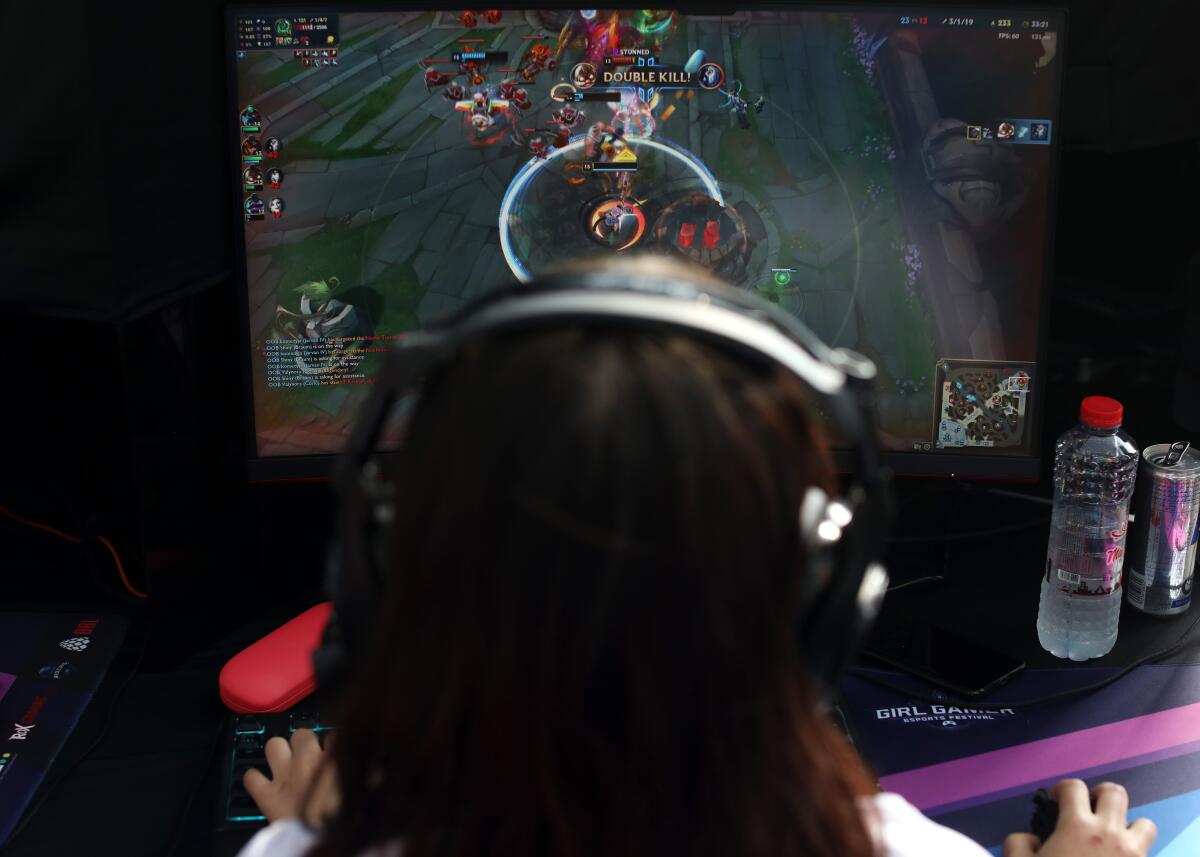
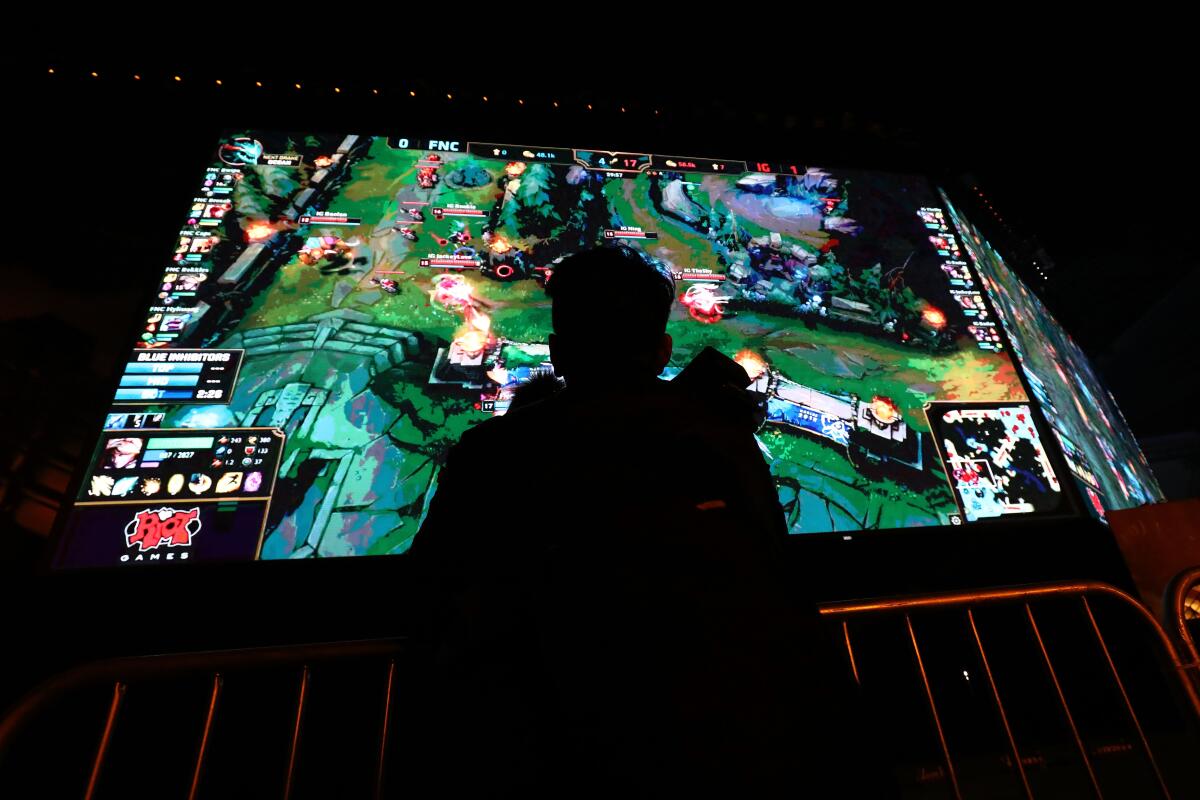
The infusion accelerated the industry’s expansion. Live competitions with massive audiences became common. Events filled Staples Center and Madison Square Garden. Millions of dollars have been awarded to players in different games, and several players boast career earnings of more than $1 million.
In recent weeks, traditional sports entities with esports partnerships have turned to the virtual world after their schedules were abruptly detonated. Leonsis’ Monumental Sports and Entertainment Group recently began airing one-hour video game simulations of previously scheduled Wizards and Capitals games on NBC Sports Washington. Formula 1 ran a race with professional drivers and gamers that aired on Twitch. On Friday, MLB held a tournament with four major leaguers on MLB: The Show 20 and steamed it on different platforms.
NASCAR aired a virtual version of the Dixie Vodka 150 at Homestead-Miami Speedway on FOX two Sundays ago with the participants using racing simulators remotely. The real-life NASCAR racers who participated were not rookies to the platform — racers have used virtual simulators as practice tools for the real thing for years. The results were proof.
Denny Hamlin, a three-time Daytona 500 winner, edged out retired driver Dale Earnhardt Jr. for the win in a $40,000 iRacing rig at his house, barefoot with his daughter cheering behind him. NASCAR Hall of Famer Jeff Gordon was one of three people on the call for the 35-car race from a studio in Charlotte. The inaugural event drew more than 900,000 viewers, making it the highest-rated esports television program in history.
“NASCAR’s transition [to esports] has been the most intriguing.”
On Sunday, Timmy Hill, a 27-year-old pro driver who has never won a NASCAR Cup Series race, won the second virtual race at Texas Motor Speedway.
NASCAR chief digital officer Tim Clark said the plan is to continue staging virtual versions of its races, following the usual schedule, until its season resumes. As it stands, the on-track season is suspended until May 9.
For its part, the League of Legends Championship Series confronted the coronavirus outbreak like traditional sports leagues, realizing quickly that continuing as usual was irresponsible.
A day after announcing plans to proceed without a studio audience, media and non-essential personnel, the league on March 13 postponed that weekend’s competition entirely. Four days later, the league announced it was going remote for the foreseeable future.
Greeley, the commissioner, said the decision was not easy. In-person events not only make for better entertainment, but better competition. Playing remotely could lead to slower connections, which impacts gameplay. And players are less supervised, opening opportunities for cheating. The league spent the next week devising a plan to limit network issues and rule-breaking.
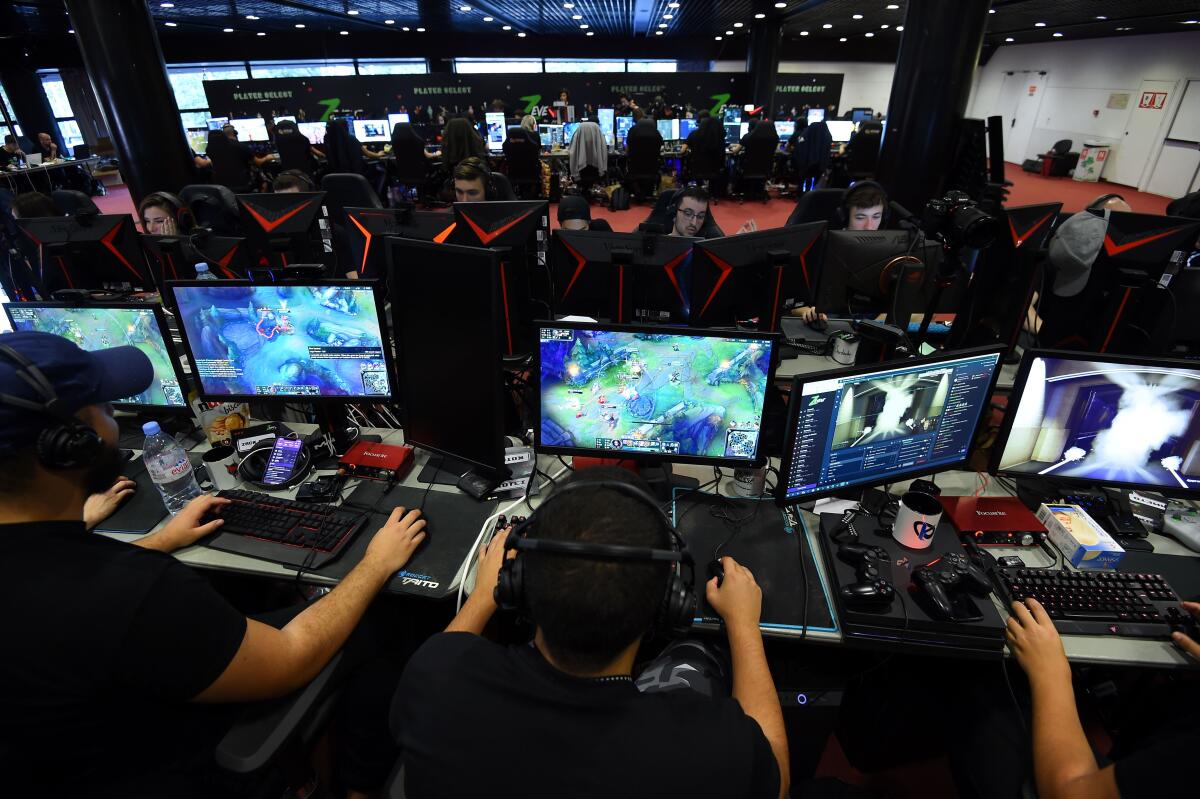
On Wednesday, LCS announced the rest of the season, including the finals, which originally were scheduled to be held in a 12,000-seat stadium at the Dallas Cowboys’ practice facility in Frisco, Texas, April 18-19, would take place online.
“We can play from home,” said Steve Arhancet, co-owner and CEO of Team Liquid, the reigning LCS champions. “That makes us a much more resilient entertainment industry when it comes to competitive sports.”
The 10-team LCS returned from its one-week postponement with five matches. The battles comprised Week 8 of the competition’s spring split. A team named Cloud 9 won both of its matches, improving its league-best record in the march toward a $200,000 prize pool to supplement player salaries that average more than $300,000.
::
The four neat rectangles were back on my television after the final match on March 22. The host, in the top left, thanked everyone who made the event possible. He implored the audience for feedback to improve. They were poised to return the next weekend. After another week without sports, I was too.
All-Star guard Devin Booker says playing “Call of Duty” helped him stay in touch with his friends long before he was told to quarantine at home.
More to Read
Go beyond the scoreboard
Get the latest on L.A.'s teams in the daily Sports Report newsletter.
You may occasionally receive promotional content from the Los Angeles Times.

